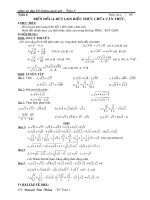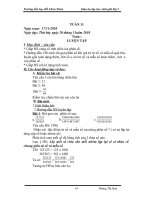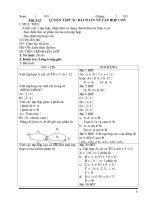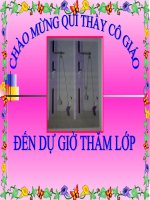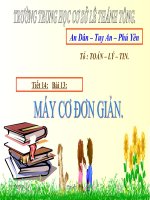GIÁO án DẠY TIẾNG ANH 11 unit 9
Bạn đang xem bản rút gọn của tài liệu. Xem và tải ngay bản đầy đủ của tài liệu tại đây (163.58 KB, 23 trang )
GIÁO ÁN DẠY TIẾNG ANH 11 TUẦN 1:
UNIT 9: THE POST OFFICE
Vocabulary:
1.
2.
3.
4.
5.
6.
7.
8.
9.
10.
Equip (v) / i´kwip/: trang bị.
Be equipped with something: được trang bị cái gì.
Equipment (n) /ɪˈkwɪpmənt/: thiết bị, sự trang bị.
Advanced (a) /əd'vɑ:nst/: tiên tiến, cấp cao.
Advancement (n) /ədˈvɑːnsmənt/: sự tiến bộ.
Advance (v) /ədˈvɑːns/: tiến lên, tiến bộ.
Spacious (a) /´speiʃəs/: rộng rãi.
Space (n) /speɪs/: không gian.
Well-trained (a) /wel-treɪnd/: lành nghề, được đào tạo tốt.
Staff (n) /stæf /: đội ngũ nhân viên.
Thoughtful (a) /´θɔ:tfl/: chu đáo, quan tâm, ân cần.
Courteous(a) /ˈkɜːtiəs/: lịch sự.
Courteousness (n) ´kə:tiəsnis/: sự lịch sự.
Mail (n) /meɪl/: thư tín.
Parcel (n) /ˈpɑːsəl/: bưu phẩm.
Mail and Parcel service /meɪl ə nd ˈpɑːsl ˈsɜːvɪs/ : dịch vụ chuyển phát thư và
11.
12.
13.
bưu phẩm.
Surface mail /ˈsɜːfɪs meɪl/: thư gửi bằng đường bộ hay đường biển.
Airmail /ˈeəmeɪl/: thư gửi bằng đường hàng không.
Express (a,n) /ɪkˈspres/: nhanh, hỏa tốc, tốc hành.
Express Mail Service (EMS) /ɪkˈspres meɪl ˈsɜːvɪs/: dịch vụ thư chuyển phát
14.
15.
16.
17.
18.
19.
nhanh.
Weight limit /weɪt ˈlɪmɪt/: trọng lượng giới hạn.
Deliver (v) /di'livə/: phát, giao.
Delivery (n) /di'livəri/: sự phát, giao.
Competitive (a) /kəmˈpetətɪv/: có tính cạnh tranh.
Compete (v) /kəmˈpiːt/: cạnh tranh, thi đua.
Competition (n) / ˌkɒmpəˈtɪʃn /: sự cạnh tranh, cuộc thi.
Transfer (n,v) /træns'fɜ:(r): chuyển, nhượng.
Transferable (a) /trænsˈfɜːrəbl ̩/: có thể di chuyển, có thể nhượng được.
Express Money Transfer (EMT) /ɪkˈspres ˈmʌni trænsˈfɜːr/: chuyển tiền nhanh.
Speedy (a) /ˈspiːdi/: nhanh chóng.
Speed (n) /spiːd/: tốc độ.
Secure (a) /sɪˈkjʊər/: an toàn.
20.
21.
22.
23.
24.
25.
26.
27.
28.
29.
30.
31.
32.
33.
34.
35.
36.
37.
38.
39.
40.
41.
42.
43.
44.
Security (n) /sɪˈkjʊərɪti/: an ninh, sự an toàn.
Messenger Call Service (n) /ˈmesɪndʒər kɔːl ˈsɜːvɪs/: dịch vụ điện thoại.
Notify (v) /ˈnəʊtɪfaɪ/: thông báo.
Notification (n) /¸noutifi´keiʃən/: sự thông báo.
Recipient (n) /rɪˈsɪpiənt/: người nhận.
Original (a) /ə'ridʒənl/: nguyên bản, (thuộc) gốc.
Origin (n) /'ɔridӡin/: gốc, nguồn gốc.
Facsimile (n) /fækˈsɪmɪli/ : bản sao.
Transmit (v) /trænzˈmɪt/: truyền đi.
Transmission (n) /trænzˈmɪʃən/: sự truyền đi.
Graphics (n) /ˈgræfɪks/: đồ họa, bức họa.
Press distribution /pres ˌdɪstrɪˈbjuːʃən/: dịch vụ phân phát báo chí.
Subscribe (v) /səbˈskraɪb/: đăng kí.
Subscriber (n) /səbˈskraɪbər/: người đăng kí.
Subscription (n) /səbˈskrɪpʃən/: sự đăng kí.
Cramped (a) /kræmp t/: chật hẹp.
Rude (a) /ruːd/: thô lỗ, khiếm nhã.
Rudeness (n) /ˈruːdnəs/: sự thô lỗ, sự khiếm nhã.
Outdated (a) /ˌaʊtˈdeɪtɪd/: lỗi thời.
Unique (a) /jʊˈniːk/: độc đáo.
Imaginative (a) /ɪˈmædʒɪnətɪv/: giàu tưởng tượng.
Evidence (n) /ˈev.ɪ.dəns/:bằng chứng.
Rate (n) /reit/: tỷ lệ, giá, tốc độ.
Clerk (n) /kla:k/: nhân viên, thư kí.
Customer (n) ´kʌstəmə/: khách hàng.
Install (v) /ɪnˈstɔːl/: lắp đặt.
Installation (n) /instə'leiʃn/: sự lắp đặt
Telephone line /´telefoun lain/: đường dây điện thoại.
Take place /teik pleis/: diễn ra.
Registration (n) /ˌredʒɪˈstreɪʃən/: sự đăng kí
Register (v) /ˈredʒɪstər/: đăng kí.
Fee (n) /fiː/: phí.
Flower Telegram Service /ˈflaʊər ˈtelɪgræm ˈsɜːvɪs/: dịch vụ điện hoa.
Provide (v) /prə'vaid/: cung cấp.
Provision (n) /prəˈvɪʒən/: sự cung cấp.
Provide someone with something/ Provide something to someone: Cung cấp
45.
46.
47.
48.
49.
cho ai cái gì.
Greetings card (greeting card) /ˈɡriːtɪŋz kɑ:d/: thiệp chúc mừng.
Bunch (n) /bΛnt∫/: búi, chùm, bó, cụm.
Cellphone (n) /ˈselfəʊn/: điện thoại di động.
Make (n) /meɪk/: hiệu (hàng hóa).
Advantage (n) /əd'vɑ:ntidʤ/: lợi ích, sự thuận lợi, lợi thế.
Disadvantage (n) ˌdɪsədˈvɑntɪdʒ/: sự bất lợi, thế bất lợi, sự thiệt hại, mối tổn
50.
51.
52.
53.
54.
55.
56.
57.
58.
59.
60.
61.
62.
63.
64.
65.
66.
67.
68.
69.
70.
71.
72.
73.
74.
75.
thất.
Commune (n) /ˈkɒmjuːn/: xã.
Communal growth /ˈkɒmjʊnəl grəʊθ/: sự phát triển cộng đồng.
Subscriber (n) /səbˈskraɪbər/: thuê bao.
Digit (n) /ˈdɪdʒɪt/: con số.
Digital (a) /ˈdɪdʒɪtəl/: thuộc về số, kĩ thuật số.
Rural (a) /ˈrʊərəl/: thuộc nông thôn
Network (n) / ˈnetwɜːk/: mạng lưới.
Capacity (n) /kəˈpæsəti/: sức chứa, khả năng, năng lực.
Rank (n,v) /ræɳk/: hàng, dãy, xếp hạng.
Growth (n) /grouθ/: sự tăng trưởng, sự phát triển, sự lớn mạnh.
Grow (v) /grou/: lớn lên, tăng trưởng.
Fixed telephone /fɪkst ˈtelɪfəʊn/: điện thoại cố định.
Upgrade (v) /ʌpˈgreɪd/: nâng cấp.
Aspect (n) /ˈæspekt/: vẻ ngoài, diện mạo, hướng, khía cạnh, mặt.
Development (n) /di’veləpmənt/: sự phát triển, sự tiến triển.
Develop (v) /di'veləp/: phát triển.
Telecommunication (n) /,telekə,mju:ni'keiʃn/: viễn thông.
Addition (n) /ə'dɪʃn/ : sự thêm vào, tính cộng.
Add (v): thêm vào, cộng vào.
Reduction (n) /rɪˈdʌkʃən/: sự giảm sút.
Reduce (v) /rɪˈdjuːs/: giảm, rút gọn.
Demand (n,v) /dɪˈmɑːnd/: yêu cầu, nhu cầu.
Expansion (n) /ɪkˈspænʃən/: sự mở rộng, bành trướng.
Expand (v) /ɪkˈspænd/: mở rộng, bành trướng.
Expansive (a) /ɪkˈspænsɪv/: rộng lớn.
Express (v) /iks'pres/ : bày tỏ, biểu lộ.
Expression (n) /iks'preʃn/: sự bày tỏ, biểu lộ.
Satisfaction (n) /,sætis'fæk∫n/: sự hài lòng, thỏa mãn.
Satisfy (v) /'sætisfai/: làm cho hài lòng, thỏa mãn.
Satisfied (a) /'sætisfaid/: cảm thấy hài lòng, vừa ý, thỏa mãn.
Dissatisfaction (n) /dis¸sætis´fækʃən/: sự không hài lòng.
Dissatisfy (v) /'dis'sætisfai/: không làm hài lòng, làm bất mãn.
Dissatisfied (a) /dis´sætis¸faid/: không hài lòng, bất mãn.
Imagine (v) /i'mæʤin/: tưởng tượng.
Quality (n) /'kwɔliti/: chất lượng.
Attitude (n) /ˈætɪtjuːd/: thái độ.
Arrogant (a) /ˈærəgənt/: kiêu căng, ngạo mạn.
Arrogance (n) /ˈærəɡəns/: sự kiêu căng, sự ngạo mạng.
Polite (a) /pəˈlaɪt/: lịch sự.
Impolite (a) /ˌɪmpəˈlaɪt/:bất lịch sự.
Politeness (n) /pə´laitnis/:sự lịch sự, phẩm chất lễ độ, cử chỉ lễ phép.
76. Pickpocket (n) /ˈpɪkˌpɒkɪt/: trộm móc túi.
77. Reasonable (a) /ˈriːzənəbl ̩/: hợp lý.
Unreasonable (a) /ʌnˈriːzənəbl ̩/: vô lý.
78. Punctuality (n) /ˌpʌŋktʃuˈæləti/: sự đúng giờ.
Punctual (a) /ˈpʌŋktʃuəl/: đúng giờ.
79. Director (n) /di'rektə/: giám đốc, người chỉ huy.
80. Resident (n) /ˈrezɪdənt/: cư dân.
81. Flat (n) /flæt/: căn hộ.
82. Steal (v) /sti:l/: ăn cắp, lấy trộm.
83. Design (v) /di´zain/: thiết kế.
Designer (n) /di´zainə/: nhà thiết kế.
84. Burglar (n) /'bə:glə/: kẻ trộm.
85. Brave (a) /breɪv/: dũng cảm.
Bravery (n) /ˈbreɪvəri/: sự dung cảm.
86. Break into /breɪk ˈɪntuː/: đột nhập.
87. Shoplifter (n) /ˈʃɒpˌlɪftər/: kẻ ăn cắp ở cửa hàng.
88. Coward (n,a) /ˈkaʊəd/: hèn nhát, người hèn nhát.
89. Tenant (a) /ˈtenənt/: người thuê (nhà, đất).
90. Borrow (v) /'bɔrou/: vay, mượn.
91. Pacifist (n) /ˈpæsɪfɪst/: người theo chủ nghĩa hòa bình.
92. War (n) /wɔ:/: chiến tranh.
93. Orphan (n) /ˈɔːfən/: trẻ mồ côi.
Orphanage (n) /´ɔ:fənidʒ/: trại trẻ mồ côi.
94. Injure (v) /in'dӡə(r)/: làm tổn thương, làm hại, làm bị thương.
Injured (a) /´indʒə:d/: bị tổn thương, bị làm hại, bị thương.
95. Waitress (n) /'weitris/: nhân viên phục vụ nữ.
96. Impatient (a) /ɪmˈpeɪʃənt/: không kiên nhẫn.
Patient (n,a) /'peiʃənt/: bệnh nhân, kiên nhẫn.
Patience (n) /´peiʃəns/: tính kiên nhẫn, sự bền chí.
97. Destroy (v) /dis'trɔi/: phá hủy.
Destruction (n) /dis'trʌk∫n/: sự phá hủy.
98. Arrest (v) /ə´rest/: bắt giữ.
99. Release (v) /rɪˈliːs/: thả, phóng thích.
100.
Sales (n) /´seilz/: doanh số, phòng kinh doanh.
101.
Account (n) /ə'kaunt/: sự tính toán, phòng kế toán.
102.
Enquiry (n) /in'kwaiəri/: câu hỏi, sự đòi hỏi, sự yêu cầu.
103.
Colleague (n) /ˈkɒli:g/: đồng nghiệp.
104.
Custom (n) /'kʌstəm/: phong tục, tục lệ.
105.
Celebrate (v) /'selibreit/: kỉ niệm, làm lễ kỉ niệm, tán dương, ca tụng.
Celebration (n) /,seli'breiʃn/: lễ kỉ niệm, sự tán dương, ca tụng.
106.
Gather (v) /'gæðə/: tập hợp, tụ họp lại.
107.
Grape (n) /greɪp/: quả: nho.
108.
Symbol (n) /simbl/: biểu tượng.
Symbolize (v) /ˈsɪmbəˌlaɪz/: tượng trưng cho, là biểu tượng của.
109.
Embrace (n,v) /im'breis/: sự ôm, cái ôm, ôm chặt.
Task 1: Chọn từ trái nghĩa với từ in nghiêng.
1.
2.
3.
4.
Đáp án C. cramped (a) /kræmp t/: chật hẹp.
Đáp án B. rude (a) /ruːd/: thô lỗ.
Đáp án D. slow.
Đáp án C. Changed.
Task 2: Đọc lại đoạn văn, dịch câu hỏi sau đó trả lời.
1. It’s equipped with advanced technology and a spacious and pleasant front office.
2. Mail and Parcel Service, express Money Transfer, Phone Calls and Faxes, Press
Distribution.
3. They are air mail, surface mail, and the Express Mail Service (EMS).
4. It’s used for notifying the recipient of the time and place to receive the call.
5. You’ll have to subscribe to your favourite newspapers and magazines.
Task 3: Tìm bằng chứng trong đoạn văn.
1.
2.
3.
The Post Office opens daily from 7 am to 9 pm.
We offer a very competitive rate for parcels of under 15 kg.
We also have the Express Mail Service and your EMS mail will be delivered in
the shorted possible time.
4. We offer a speedy and secure service of transferring money in less than 24 hours.
After you read: Thảo luận nhóm trả lời câu hỏi.
Câu trả lời tự do. Ví dụ:
1. Which service provided by Thanh Ba Post office do you think is the most
important and why?
1. In my opinion, it is Express Money Transfer. Because when you send some
money to your relatives, certainly you can’t feel safe and wonder whether it
arrives or not. Now with this service, you feel much safer. Your money isn’t only
sent quickly but also securely.
The EMS is important because not only our letters but also documents are sent to
the recipient safely and quickly.
2. What services do you think Thanh Ba Post office should have in the future?
I think they should expand their services such as the Flower Telegram service and
the Bank services.
BÀI TẬP CỦNG CỐ:
I. Complete these sentences with the correct form of the words from the box.
compete distribute
courteous
1.
2.
3.
4.
5.
6.
7.
8.
9.
10.
transmit
transfer
space
subscribe
post
deliver
satisfy
All mail ...... were suspended during the strike.
It's only common ...... to thank someone when they help.
Do you wish to take out a full twelve-month ...... to the journal?
We offer a wide range' of goods at very ...... prices.
If you are ...... with our service, please write to the manager,
This ticket is only used by the person who bought it. It is not .......
Fax ...... has now become a cheap and convenient way to transmit texts over distances.
White walls can give a feeling of ......
The newspaper is ...... free.
How much was the ...... on that letter?
Dặn dò học sinh về nhà học thuộc từ mới.
Buổi 2:
Kiểm tra bài cũ:
-
Viết nghĩa Tiếng Anh của những từ sau:
Trang bị
Tiên tiến, cấp cao
Rộng rãi
Lành nghề
Đội ngũ nhân viên
Chu đáo, quan tâm, ân cần
Lịch sự => sự lịch sự
Dịch vụ chuyển phát thư và bưu phẩm.
Thư gửi bằng đường bộ và đường biển
Thư gửi bằng đường hàng không
Dịch vụ thư chuyển phát nhanh
Có tính cạnh tranh
Cạnh tranh, thi đấu
Sự cạnh tranh, cuộc thi
Nhanh chóng
Chuyển, nhượng
Dịch vụ điện thoại
Thông báo
Người nhận
Bản sao, máy fax
Truyền đi
Bức họa, đồ họa
Dịch vụ phân phát báo chí
Đăng kí
Người đăng kí
Sự đăng kí
Dịch vụ chuyển tiền nhanh
Phát, giao
Nguồn gốc
Nguyên bản, thuộc gốc
An toàn
An ninh
Thư tín
Bưu phẩm
Trọng lượng giới hạn
Chật hẹp
Độc đáo
Bằng chứng
Thô lỗ, khiếm nhã
Sự thô lỗ, khiếm nhã
Giàu tưởng tượng
Ngữ pháp:
I.
CÁC ĐẠI TỪ QUAN HỆ
1. Who: -Là đại từ quan hệ chỉ người, làm chủ ngữ, theo sau who là một động từ
Eg:
The man who is sitting by the fire is my father.
2. Whom: -Là đại từ quan hệ chỉ người làm tân ngữ, theo sau whom là một chủ ngữ
Eg:
The woman whom you saw yesterday is my aunt.
3. Which: Là đại từ quan hệ chỉ vật, làm chủ ngữ hoặc tân ngữ cho động từ sau nó.
-Theo sau which có thể là một động từ hoặc một chủ ngữ.
Eg:
This is the book. I like it best.=> This is the book which I like best.
The hat is red. It is beautiful.=> The hat which is red is beautiful.
-Khi which làm tân ngữ, ta có thể lược bỏ which.
4. That: Là đại từ quan hệ chỉ cả người lẫn vật, có thể được dùng thay cho Who,
Whom, Which trong mệnh đề quan hệ thuộc loại Defining Clause (Mệnh đề xác định)
Eg: That is the book that I like best.
That is the bicycle that belongs to Tom.
My father is the person that I admire most.
I can see the girl and her dog that are running in the park.
5.Whose:Là đại từ quan hệ chỉ người, thay cho tính từ sở hữu.
-Theo sau Whose luôn là 1 danh từ
Eg: The boy is Tom. You borrowed his bicycle yesterday.
=> The boy whose bicycle you borrowed yesterday is Tom.
John found a cat. Its leg was broken.
John found a cat whose leg was broken.
II. CÁC TRẠNG TỪ QUAN HỆ
1. When: là trạng từ quan hệ chỉ thời gian, dùng thay cho at, on, in + which, then
Eg:
May Day is the day when people hold a meeting. (= on which)
I’ll never forget the day when I met her.
(=on which)
That was the time when he managed the company. (= at which)
2. Where: là trạng từ quan hệ chỉ nơi trốn, thay cho at, on, in + which; there)
Eg:
That is the house where we used to live. (= in which)
Do you know the country where I was born?
Hanoi is the place where I like to come.
3. Why: là trạng từ quan hệ chỉ lí do, thường đứng sau “the reason”, dùng thay cho “for
the reason”
Eg:
Please tell me the reason why you are so sad. (= for which)
He told me the reason why he had been absent from class the day before.
TÓM TẮT:
WHO : dùng thế cho chủ ngữ - người
WHOM : dùng thế cho tân ngữ- người
WHICH : dùng thế cho chủ ngữ lẫn tân ngữ - vật
THAT :dùng thế cho tất cả các chữ trên
WHOSE :dùng thế cho tính từ sở hữu, người / vật.
WHY: dùng thế cho lý do ( reason /cause )
WHEN: dùng thế cho thời gian
WHERE: dùng thế cho nơi chốn
III. CÁC LOẠI MỆNH ĐỀ QUAN HỆ:
1. Mệnh đề quan hệ xác định (defining relative clause)
- Mệnh đề quan hệ xác định dùng để bổ nghĩa cho danh từ đứng trước, là bộ phận quan
trọng của câu, nếu bỏ đi mệnh đề chính không có nghĩa rõ ràng.
Eg The girl who is wearing the blue dress is my sister.
The book which I borrowed from you is very interesting.
2. Mệnh đề quan hệ không xác định (non- defining relative clause )
- Mệnh đề quan hệ không xác định dùng để bổ nghĩa cho danh từ đứng trước,là phần giải
thích thêm, nếu bỏ đi mệnh đề chính vẫn còn nghĩa rõ ràng.
- Mệnh đề quan hệ không xác định thường được ngăn với mệnh đề chính bởi các dấu
phẩy. Danh từ đứng trước thường là tên riêng hoặc trước các danh từ thường có các từ
như: this, that, these, those, my, his, her…đứng trước.
- Không được dùng that trong mệnh đề không xác định.
Eg: My father, who is 50 years old, is a doctor.
This girl, whom you met yesterday, is my daughter.
Lưu ý về mệnh đề quan hệ
-
Các đại từ quan hệ có chức năng tân ngữ trong mệnh đề quan hệ xác định đều có
thể lược bỏ.
Eg: Do you know the boy (whom) we met yesterday?
That’s the house (which) I have bought.
-
Tuy nhiên các đại từ quan hệ có chức năng tân ngữ trong mệnh đề quan hệ không
xác định không thể lược bỏ.
Eg: Mr Tom, whom I spoke on the phone to, is very interested in our plan.
-
Các trường hợp sau đây thường phải dùng ‘that’
a. Khi cụm từ đứng trước là danh từ vùa chỉ người vừa chỉ vật
Eg:
He told me about the places and people that he had seen in London
b. Sau các tính từ so sánh hơn nhất, first và last
Eg:
This is the most interesting film that I’ve ever seen.
Moscow is the finest city that she’s ever visited.
That is the last letter that he wrote.
She was the first person that broke the silence.
c. Sau các từ all, only (duy nhất) và very (chính là)
Eg:
All that he can say is this.
I bought the only book that they had.
You’re the very man that I would like to see.
d. Sau các đại từ bất định
He never says anything that is worth listening to.
I’ll tell you something that is very interesting.
BÀI TẬP:
I.
1.
2.
3.
4.
5.
6.
7.
8.
9.
10.
11.
12.
13.
14.
15.
Write all the pronouns possible to complete each sentence. Write Ø if the
sentence is correct without adding a pronoun.
We talk about the party ...... Sarah wants to organise for my birthday.
To get to Frank's house, take the main road ..... bypasses the village.
The paintings ...... Mr Flowers has in his house are worth around £100,000.
Mrs Richmond, ...... is 42, has three children,
Don is a friend ...... I stayed with in Australia.
She was probably the hardest working student ...... I've ever taught.
Stevenson is an architect ...... designs have won international praise.
The Roman coins, ...... a local farmer came across in a field, are now displayed in the
National Museum.
Dorothy said something ...... I couldn't hear clearly.
There was a little ...... we Gould do to help her.
He received a low mark for his essay; ...... was only one page long.
We need to learn from companies ...... trading is more healthy than our own.
Professor Johnson, ...... I have long admired, is visiting the University next week.
The man ...... I introduced to you last night may be the next president of the
university.
These walls are all ...... remain of the city.
II. Write all the pronouns possible to complete each sentence. Write Ø if the
sentence is correct without adding a pronoun.
1.
We talk about the party ...... Sarah wants to organise for my birthday.
2.
To get to Frank's house, take the main road ..... bypasses the village.
3.
The paintings ...... Mr Flowers has in his house are worth around £100,000.
4.
Mrs Richmond, ...... is 42, has three children,
5.
Don is a friend ...... I stayed with in Australia.
6.
She was probably the hardest working student ...... I've ever taught.
7.
Stevenson is an architect ...... designs have won international praise.
8.
The Roman coins, ...... a local farmer came across in a field, are now displayed in
the National Museum.
9.
Dorothy said something ...... I couldn't hear clearly.
10.
There was a little ...... we Gould do to help her.
11.
He received a low mark for his essay; ...... was only one page long.
12.
We need to learn from companies ...... trading is more healthy than our own.
13.
Professor Johnson, ...... I have long admired, is visiting the University next week.
14.
The man ...... I introduced to you last night may be the next president of the
university.
15.
These walls are all ...... remain of the city.
III. Write the information in brackets as a relative clause (defining or non-defining)
in an appropriate place in the sentence. Give alternative relative pronouns if
possible. (Use - to indicate ‘no relative pronoun’.)
1.
Julia's father has just come back from a skiing holiday. (he is over 80)
........................................................
2.
The problems faced by the company are being resolved. (I'll look at these in detail
in a moment.)
........................................................
3.
She was greatly influenced by her father. (she adored him.)
........................................................
4.
Parents are being asked to take part in the survey. (their children are between four
and six.)
........................................................
5.
He isn't looking forward to the time. (he will have to leave at that time.)
........................................................
6.
The Roman coins are now on display in the National Museum. (a local farmer
came across them in a field.)
........................................................
7.
He pointed to the stairs. (they led down to the cellar.)
........................................................
8.
These drugs have been withdrawn from sale. (they are used to treat stomach
ulcers.)
........................................................
9.
The singer had to cancel her concert. (she was recovering from flu)
........................................................
10.
The minister talked about the plans for tax reform. (he will reveal them next
month.)
........................................................
11.
We went to the Riverside Restaurant. (l once had lunch with Henry there.)
........................................................
12.
My aunt is now a manager of a department store. (her first job was filling shelves
in a supermarket.)
........................................................
13.
John Graham's latest film is his first for more than five years. (the film is set in the
north of Australia.)
........................................................
14.
The newspaper is owned by the Mears group. (its chairperson is Sir James Bex)
........................................................
15.
The Master's course is no longer taught. (I took this course in 1990.)
........................................................
IV. If necessary, correct or make improvements to these sentences. If they are
already correct, write .
1.
He just said anything which came into his head.
2.
Yesterday was the hottest day I can remember.
3.
There isn't much can go wrong with the machine.
4.
Thieves whom stole paintings from Notfort art gallery have been arrested in Paris.
5.
It may be the most important decision which you will ever take.
6.
The boy took the photograph was paid £100.
7.
The Southham Chess Club, that has more than 50 members, meets weekly on
Friday evenings.
8.
The clock makes a noise what keeps me awake at night.
9.
I heard many different accents in the room, but none which I could identify as
British.
10.
She is one of the kindest people who I know
Về nhà:
-
Học thuộc từ vựng.
Ôn lại lý thuyết mệnh đề quan hệ, đại từ, trạng từ quan hệ.
Buổi 3:
Kiểm tra bài cũ:
Nhân viên, thư kí
Khách hàng
Lắp đặt
Sự lắp đặt
Đường dây điện thoại
Diễn ra
Đăng kí => sự đăng kí
Phí
Dịch vụ điện hoa
Cung cấp => Sự cung cấp
Thiệp chúc mừng
Bó, chùm, cụm
Tỷ lệ, giá, tốc độ
Dịch vụ chuyển tiền nhanh
Dịch vụ chuyển phát thư và bưu phẩm
Thư gửi bằng đường hàng không
Thư gửi bằng đường biển và đường bộ
Người đăng kí
An toàn
Lịch sự
Rộng rãi
Chu đáo, ân cần
Lành nghề, được đào tạo tốt
Lỗi thời
Độc đáo
Chuyển, nhượng
Sự truyền đi
Đội ngũ nhân viên
Bản sao
Nguyên bản, (thuộc) gốc
Giàu tưởng tượng
Dịch vụ phân phát báo chí
Dịch vụ điện thoại
Phát, giao
Thông báo
Sự thông báo
Người nhận
Sự tiên tiến, sự tiến bộ
Cuộc thi, sự cạnh tranh
Cạnh tranh, thi đấu
Có tính cạnh tranh
Tiên tiến, cấp cao
Trang bị
Bằng chứng
Bức họa, đồ họa
BÀI TẬP:
I. Choose the best answer.
1.
Post office is a place ...... you can buy stamps, mail letters and packages, and
receive mail.
A. that
2.
B. which
B. in which C. on that
D. when
My uncle ...... you met yesterday is a lawyer.
A. which
4.
D. in which
Do you know the date ...... we have to hand in the essay?
A. which
3.
C. where
B. who
C. whose
D. to whom
The council is in discussion with Lord Thomas, ...... land most of the village is
built on.
A. who
5.
D. that
B. who
C. that
D. when
Regina, ...... you have never met before, is a genius in painting.
A. that
7.
C. whose
These adults, ...... come to my night class, are very eager to learn.
A. whose
6.
B. whom
B. whose
C. whom
D. whoever
The paintings Mr Flowers has in his house are worth around $ 100,000.
A. which
B. whose
C. what
D. whom
8.
Oxford, ...... attracts many tourists, is often crowded in the summer.
A. that
9.
B. which
D. where
B. when
C. where
D. that
B. Whoever C. Which
D. Whichever
I think the reason ...... we get on so well is that we both enjoy talking.
B. which
C. that
D. what
Children ... diets contain high levels of protein do better in examination.
A. who
15.
C. which
...... wins will go on to play Barcelona in the final.
A. why
14.
D. that
Most folk songs are ballads ...... have simple words and tell simple stories.
A. Who
13.
C. whose
B. what
A. what
12.
B. whom
She cycled from London to Glasgow, .... is pretty good for a woman of 75.
A. that
11.
D. where
It's the best film ...... has ever been made about madness.
A. which
10.
C. whose
B. who
C. whose
D. Ø
I'm sure that Keith will do well at university, ...... one he goes to.
a. which
b. whichever c. where
d. wherever
II. Fill in each blank with an appropriate preposition.
1.
We take great pride ...... offering the best service in town.
2.
This post office is equiped ...... advanced technology ...... transaction.
3.
What is the Messenger Call Service used ......?
4.
Let us take care ...... your postal and telecommunication needs for now and ever.
5.
We subscribe ...... all the main medical journals.
6.
This computer isn't capable ...... running this software.
7.
She seemed satisfied ...... the results.
8.
She was fiercely proud ...... family traditions and continuity.
9.
I was useful ...... them because I could speak French.
10.
I am living away ...... my family and my relatives.
III. Complete the second sentence so that it has a similar meaning to the first one.
1.
I live in the town not far from the capital.
The town ............................................
2.
Nobody does it better than you.
There isn't ...........................................
3.
Thanks to Laura's report, I was able to finish the project.
Had ................................................
4.
He got down to writing the letter as soon as he returned from his walk.
No sooner ...........................................
5.
That question cannot be answered satisfactorily.
There is .............................................
6.
It is my impression that she's enjoying her new job a great deal.
She seems ...........................................
7.
The secretary hasn't replied me for ten days.
No reply .............................................
8.
All of those presents were in agreement with the proposal.
Everyone ............................................
9.
It's a pity that it's too late to do anything about it.
I wish ...............................................
10.
She was so good to me that I'll always remember it.
I'll always remember ....................................
IV. Combine each pair of sentences using a relative pronoun or relative adverb:
1. She is the most intelligent woman. I’ve ever met this woman.
2. This doctor is famous. You visited him yesterday.
3. These children are orphans. She is taking care of these children.
4. The two young men are not good persons. You are acquainted with them.
5. My father goes swimming everyday. You met him this morning.
6. The man is my father. I respect this man most.
7. The man is my father. I respect his opinion most.
8. Mary and Margaret are twins. You met them yesterday.
9. I’ll introduce you to the man. His support is necessary for your project.
10. The middle-aged man is the director. My father is talking to him.
11. The boy is my cousin. You make fun of him.
12. The student is from china. He sits next to me.
13. I thanked the woman. This woman had helped me.
14. The professor is excellent. I am taking his course.
15. Mr. Smith said he was too busy to speak to me. I had come to see him.
16. I saw a lot of people and horses. They went to market.
17. Tom has three sisters. All of them are married.
18. I recently went back to Paris. It is still as beautiful as a pearl.
19. I recently went back to Paris. I was born in Paris nearly 50 years ago.
20. Do you know the music? It is being played on the radio.
21. You didn’t tell us the reason. We have to cut down our daily expenses for that reason.
22. The day was rainy. She left on that day.
23. I’ve sent him two letters. He has received neither of them.
24. That man is an artist. I don’t remember the man’s name.
25. One of the elephants had only one tusk. We saw these elephants at the zoo.
26. That car belongs to Dr. Clark. Its engine is very good.
27. You sent me a present. Thank you very much for it.
28. This is Mrs. Jones. Her son won the championship last year.
29. Rod Lee has won an Oscar. I know his sister.
30. Is this the style of hair? Your wife wants to have it.
31. A man answered the phone. He said Tom was out.
32. 7.05 is the time. My plane arrives then.
33. Max isn’t home yet. That worries me.
34. Do you know the building? The windows of the building are painted green.
35. Last week I went to see the house. I used to live in it.
36. I don’t know the girl’s name. She’s just gone into the hall.
37. Be sure to follow the instructions. They are given at the top of the page.
38. Hoan Kiem lake is a historical place. Its water is always blue.
V. Use Relative adverb to combine each pair of sentences below:
1. This is the house. We often stay in this house in summer.
2. I’ll show you the second hand bookshop. You can find valuable books in this shop.
3. I have not decided the day. I’ll go to London on that day.
4. He was born on the day. His father was away on that day.
5. The book is a telephone directory. We can look up telephone numbers in this book.
6. Mrs. Brown rang Dr. Brown. He was going to carry out an urgent operation at that
moment.
7. The airport is the most modern one. We’re going to arrive at this airport.
8. She doesn’t want to speak of the cause. She divorced her husband of this cause.
9. The days were the saddest ones. I lived far from home on those days.
10. I never forget the park. We met each other for the first time at this park.
Về nhà:
-
Học thuộc từ vựng.
